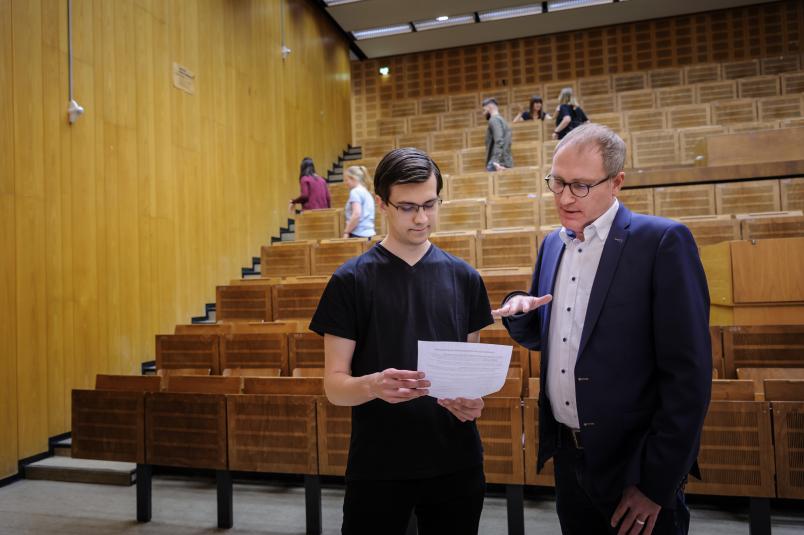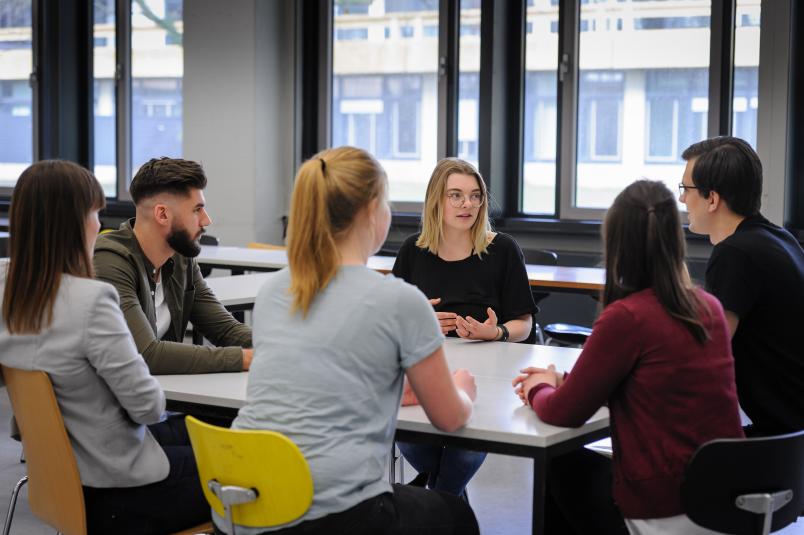Research on Learning and Instruction
The right strategies help reduce university dropout rates
In engineering sciences, the first semesters in particular are tough for students. The dropout rates are high. Still, this might yet change.
It’s the same thing every year: the first semester draws to an end, the aspiring engineers have just learned how they’ve performed in their most important exams, and there is a lot of frustration and disappointment. For many students, “failed” is the frustrating answer to the question how the exams went. “Too difficult”, “too much material in short time” are the most frequent causes of poor performance – in spite of the fact that many of the young women and men were good students at school and are confident that they have the necessary skills to pursue an engineering degree.
In engineering sciences, exams in the first two semesters are particularly important. “The first exams that students write in their degree courses cause them a lot of stress, as they differ quite drastically from school exams in terms of structure, scope and relevance; all this can be quite unnerving,” says Joachim Wirth, Professor for Research on Learning and Instruction at RUB. “Moreover, exam results are often the very first performance feedback students receive in their degree course, and they are not always pleasant.” Consequently, up to 40 per cent of all civil engineering students in Germany drop out of their course after the first or second semester.
Five strategies for successful learning
Together with his colleague Dr. Julia Waldeyer, Joachim Wirth wants to find out more about what leads to academic success in engineering sciences, and more specifically in civil engineering. The psychologists are focusing on investigating the role of so-called resource management strategies. “This term describes strategies used by students to create the right learning conditions,” says Julia Waldeyer. Prominent resource management strategies are workplace organization, time management, the motivation to learn, the option to seek help in case of problems, and the willingness to invest effort even when faced with difficulties.

“We are very much interested in such strategies, because strategies can be learned and practised,” says Joachim Wirth. “This is what distinguishes them from stable personal attributes, such as intelligence.” The fact that intelligent individuals perform better in exams than less intelligent individuals is well known and has been the subject of many studies. “However, as far as intelligence is concerned, there’s not much we can do about it in the short-term,” continues Wirth. “Whereas learning strategies can be tweaked and adjusted within a relatively short period of time. If we knew more about how they contribute to good study performance, we could make life easier for many students, especially at the beginning of their degree course.”
Learning at school differs strongly from learning at university
Resource-related learning strategies gain in importance whenever learners are left to their own devices and have to take responsibility for their own actions and performance, which is the case with university students. “Going to university is a radical change for school-leavers, and it poses many challenges when it comes to learning,” explains Julia Waldeyer.

There are quite a few differences between school and university and, consequently, between the ways how students prepare for exams: unlike at school, where smaller classes and courses guarantee that students know their teachers in person, not many university students have ever exchanged a word with their lecturers. Accordingly, there’s a greater inhibition threshold when it comes to asking university teachers for advice, or when a student needs to have something explained once again. Moreover, there’s much more material to get through, attendance is not compulsory in many lectures, and exams are written less frequently; all these factors mean that students don’t receive continuous feedback on their performance. On the whole, students have much more freedom to organise their learning at university than at school. However, this means that students are required to employ self-organization and strategies to study for their exams.
Novel test assesses resource management competencies
In order to identify in what way learning problems at the beginning of the civil engineering degree are caused by deficiencies with regard to resource management strategies, Julia Waldeyer has devised a novel psychological test instrument called “Resource Management Inventory” (Remi). To this end, she conducted group interviews with first-year students. “I asked them about the differences between learning at university and learning at school, and which resource management strategies they are familiar with and utilise in order to master the challenges of their degree course,” explains Waldeyer.

Based on the answers, 60 situations emerged that typically occur during learning at the beginning of the degree course. Waldeyer allocated an appropriate resource management strategy to each situation, which could be deployed to handle the respective problem most efficiently. In addition, she included several inappropriate strategies for each problem in the survey. “The important thing for me was to see if students choose strategies at random or if they recognise the one best strategy that should be applied in a given situation,” elaborates the psychologist.
198 first-year students in the fields of civil engineering and educational research took part in the pilot study. “We have used the humanities students as our control group, because at less than 20 per cent the dropout rate there is much lower. We wanted to know if educational research students are perhaps much more adept at utilising resource management strategies,” as Waldeyer explains her approach. What makes her study unique, moreover, is that she did not merely rely on the test participants’ self-assessment regarding their study performance; rather, she was granted permission by the students to access their official data at the examination offices.
Exam results can be predicted
For the main study, she selected 36 of the previously collated 60 situations and used them to test 380 students in both degree courses. It emerged that the participants who were more adept at applying resource management strategies were also the ones who achieved better academic results. The same still applied even after the researchers included other factors that may result in good grades in their calculations. “We have, for example, considered the A-level results, which are a strong predictor of study performance. People with good A-levels tend to perform better at university than those with poor A-levels. Stable personal attributes such as cognitive skills were likewise taken under consideration,” stresses Joachim Wirth. “Still, we calculated that the deployment of resource management strategies is a significant factor affecting overall performance. Accordingly, we are able to predict and explain the performance of individual students in exams, provided we know how well or how poorly they employ resource management strategies.” This implies that if students were taught how to use those strategies, they would presumably perform better in their degree courses.

Another significant outcome of the study is that civil engineering students had overall poorer Remi results than educational research students. Julia Waldeyer can only speculate why: “It’s conceivable that the women and men who study educational research attended advanced courses in related subjects at school, thus acquiring the relevant competencies prior to their degree course. But gender difference might be a reason, too. Educational research is a female-dominated field, whereas in civil engineering men clearly outnumber women. This, too, is a question we intend to pursue in follow-up studies.”
There is still a lot to do for Julia Waldeyer and Joachim Wirth: “First, we have to answer several fundamental questions with regard to resource management strategies. Once this is accomplished, we can feasibly develop a training scheme for school and university students that would help them acquire the relevant skills,” as both researchers outline their future plans. And who knows, dropout rates of 40 per cent among civil engineering students may become a thing of the past in a few years’ time.
Research network “Alster”



